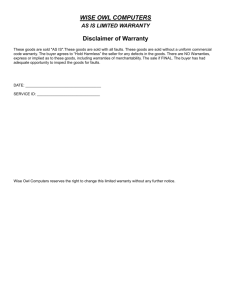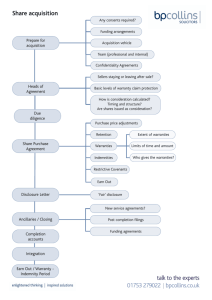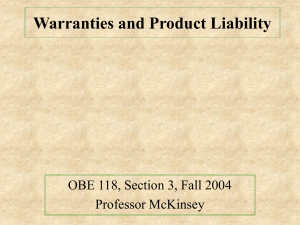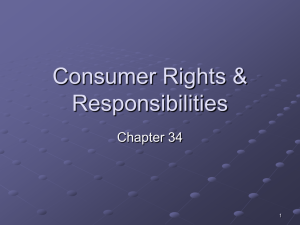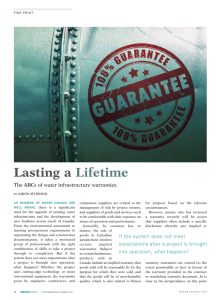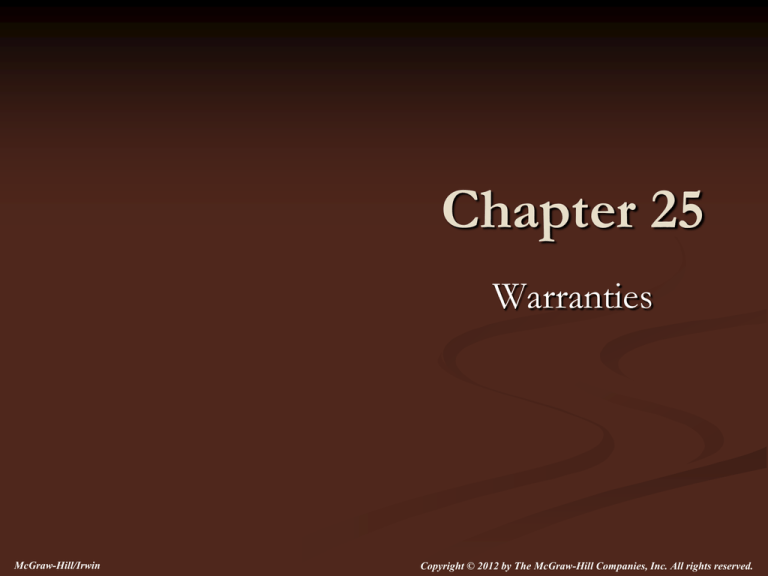
Chapter 25
Warranties
McGraw-Hill/Irwin
Copyright © 2012 by The McGraw-Hill Companies, Inc. All rights reserved.
Warranty (Definition):
Seller’s promise(s) regarding certain
characteristics of good(s) sold
25-2
“Express” Warranty Versus “Implied”
Warranty
Express Warranty: Explicitly stated in contract
Implied Warranty: Automatically (by operation of law)
applied to contract
25-3
Types of Warranties
Warranties of Title
Passage of good title
Implied promise of no liens/judgments against title
Implied promise that title not subject to claims of intellectual
property (copyright, patent, or trademark) infringement
25-4
Types of Warranties
Express Warranties
Description of good’s physical nature or its use
May be found in advertisements or brochures
May be material term of contract
Salesperson’s oral promise concerning good can give rise to express warranty
Buyer’s reliance on seller’s representations generally means those
representations become express warranties, and part of contract
25-5
Sales “Puffery”
Definition: Salesperson’s mere statement of opinion,
rather than representation of facts
“Puffing” generally does not create express warranty
liability
25-6
Types of Warranties: Implied Warranties
Implied Warranty of Merchantability (Definition): Warranty based on
reasonable expectation of product performance
Good purchased must:
Pass without objection in trade/market for similar goods
Be of fair quality (within the product’s description)
Be fit for “ordinary use”
Have “even kind, quality and quantity”
Be adequately packaged and labeled
Conform to promises made on package/product label
25-7
Types of Warranties: Implied Warranties
Implied Warranty of Fitness For Particular Purpose
(Definition): Warranty that arises when seller knows purpose for
which buyer purchasing goods, and buyer relies on seller’s
judgment to recommend/select certain product
Seller does not have to be merchant to make this warranty
25-8
Types of Warranties: Implied Warranties
Implied Warranty of Trade Usage
(Definition): Warranty that arises as result of generallyaccepted trade practices
25-9
Warranty Rights of Third Parties:
Third Party Beneficiaries of Warranties
Seller’s warranties may extend to:
Buyer’s household members and guests
Any “reasonable and foreseeable” user
Anyone injured by good
25-10
Warranty Disclaimers and Waivers
Methods of Disclaiming/Waiving Warranties:
Seller does not make express warranties
Seller disclaims implied warranties in clear, unambiguous, conspicuous
language
Buyer fails/refuses to examine goods
Buyer fails to file suit within applicable statute of limitations period
25-11
Magnuson-Moss Warranty Act
Provides that if seller decides to issue written
warranty for consumer good, seller must specify
whether warranty is “full” or “limited”
25-12

